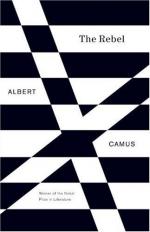
|
| Name: _________________________ | Period: ___________________ |
This test consists of 15 multiple choice questions and 5 short answer questions.
Multiple Choice Questions
1. In Part 5, murder is what or it is nothing?
(a) A desperate exception.
(b) A weak excuse.
(c) Required.
(d) Accepted.
2. What is "more useful than Shakespeare" to Pisarev, according to Part 4?
(a) A pair of shoes.
(b) A shirt.
(c) A pair of pants.
(d) A hat.
3. According to Part 4, what is the most ambitious of the arts?
(a) Sculpture.
(b) Painting.
(c) Writing.
(d) Singing.
4. According to Camus in Part 3, what did Germany submit to when deprived of Goethe's morality?
(a) Ethics of the gang.
(b) Money from the gang.
(c) Politics of the rebels.
(d) Religion of the gang.
5. What is historical revolution's demand, according to Part 3?
(a) Religion.
(b) Totality.
(c) Murder.
(d) Money.
6. In Part 3, Camus says rebellion and revolution end in the same dilemma of what two things?
(a) Government rule or insanity.
(b) Police rule or insanity.
(c) Morality or immortality.
(d) Mortality or immortality.
7. According to Part 3, what is rebellion's demand?
(a) Power.
(b) Unity.
(c) Hatred.
(d) Suicide.
8. According to Camus in Part 5, the climax of every tragedy lies in the what of its heroes?
(a) Deafness.
(b) Handicap.
(c) Blindness.
(d) Thoughts.
9. Hitler invented the perpetual motion of what, according to Part 3?
(a) Power.
(b) Conquest.
(c) Rebellion.
(d) Murder.
10. According to Camus in Part 3, Hitler's god was what?
(a) A religious figure.
(b) A nihilist.
(c) A non-believer.
(d) A political argument.
11. In Part 3, people who despair about everything can only be provided with faith by what?
(a) Passion.
(b) Reason.
(c) Money.
(d) Politics.
12. What does Camus say people become intimates of at the "climax of contemporary tragedy"?
(a) Power.
(b) Crime.
(c) Art.
(d) Religion.
13. The power to kill and degrade saves the soul from what in Part 3?
(a) Utter emptiness.
(b) Utter saddness,
(c) Utter elation.
(d) Utter happiness.
14. What does Camus say people must stake everything on in Part 3?
(a) The religion.
(b) The book.
(c) The history.
(d) The renaissance.
15. Camus states in Part 5 that there is nothing in common between what two people?
(a) Writer and painter.
(b) Rebel and victim.
(c) Politician and priest.
(d) Master and slave.
Short Answer Questions
1. According to Part 4, what is artistic creation a rejection of?
2. The desire for what is another form of the desire to endure, according to Part 4?
3. According to revolution in Part 3, man is nothing if he does not obtain what?
4. In Part 5, nihilism rejects the idea of what?
5. In the hour of Hitler's defeat, he believed himself betrayed by who?
|
This section contains 385 words (approx. 2 pages at 300 words per page) |

|




